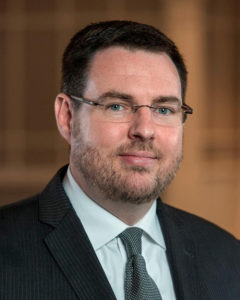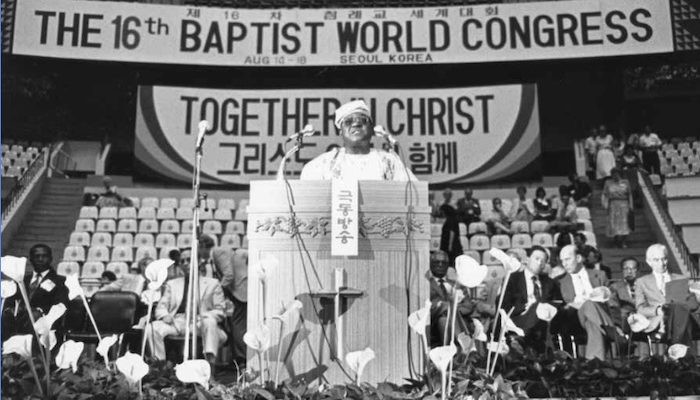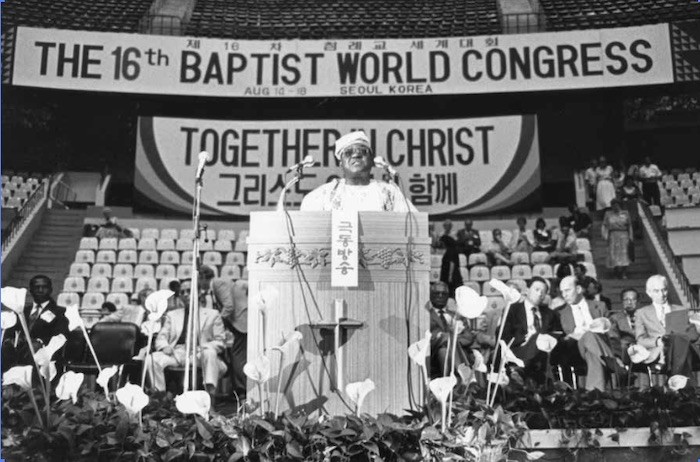The Baptist World Alliance recently announced its 22nd Baptist World Congress will be held virtually in July 2021 — a year after the original, in-person event in Rio de Janeiro, Brazil, was postponed due to the COVID-19 pandemic.
The Alliance sought to avoid further delay because the events are held every five years and planning is already under way for the 2025 congress in the Asia-Pacific region, General Secretary Elijah Brown said.
“We felt it was possible to maintain the core values of BWA and the Congress in this virtual context. We feel we can do so creatively with Holy Spirit discernment.”
The July 7-10 virtual gathering will include daily worship and prayer sessions led by global Baptist leaders, community building and networking and virtual roundtable discussions on topics such as religious freedom, leadership and missions. Registration is under way.
While planners have identified a number of advantages to holding the Congress online, Brown said there are some painful consequences to the decision, especially in the loss of face-to-face fellowship.

Elijah Brown
“There were a million Baptists in Brazil who are very disappointed they will not be hosting our global Baptist community in their country,” he said. “They had been looking forward to that for years.”
Brown spoke with Baptist News Global about the impact of moving the Congress into virtual settings, and what it may mean for the world’s Baptist community.
Why are the gatherings known as congresses?
The very first gathering in 1905 was very much a congress in the sense of convening representatives from around the world to vote the BWA into existence. While some other congresses have had some voting around resolutions and key statements, the last 20 years congresses especially have been more predominantly focused on missions, worship and celebrating a global community in ministry together.
Have there been postponements in the past?
There have been several postponements, including during World War II when there were some delays. There also have been some delays of some of our Youth Congresses.
What was the tipping point for deciding to go virtual in 2021?
We were excited to be in Rio de Janeiro in 2020, and with the onset of the pandemic it became clear we needed to postpone to 2021. But as we continued to evaluate health conditions around the world and the status of a vaccine, it just became clear that a large, in-person gathering would not be possible at a global level in 2021. So, we began exploring the possibility of holding a virtual Congress and realized this would make our gathering truly accessible to every Baptist in every country. We also saw this as a wonderful opportunity to re-imagine, together, a time to worship, a time of prayer and a time of learning with our brothers and sisters around the world.
Did the virtual gatherings of groups like the Cooperative Baptist Fellowship and the Alliance of Baptists contribute to this decision?
It had a part. In May of this year, we held our virtual worship service, for the first time, around Pentecost and had around 10,000 participants on Facebook and YouTube and realized there is an opportunity for a global community to come together in a virtual platform. And we saw other groups work through that process in 2020 and realized it was time to try this in 2021.
Who actually made this decision?
The decision resulted from a collaboration and consultation with our global stakeholders in addition to our BWA staff and team, and with our immediate past president and our current president. All of them recommended we move to a virtual platform for the 22nd Baptist World Congress. With their recommendation, the BWA executive committee assessed this as the best leading of the Holy Spirit to uphold the values of the BWA in a time of pandemic.
What is most painful about going virtual with this event?
Tremendous work had gone into planning an in-person experience in Rio de Janeiro. The last time the Congress was held there was 1960. One of the highlights of that Congress was the attendance of Billy Graham and Martin Luther King Jr. We were really looking forward to building on that tradition and highlighting our longstanding commitment to missions and ministry around the world, and to social justice.
What is the upside to a virtual BWA World Congress?
What’s truly exciting is that this has the potential to be the most diverse gathering of Baptists, not only in the history of BWA, but in our 400-year Baptist history. We have set aside scholarship money for registration for our members in 126 countries and territories. There are more Baptists today in more countries than there ever has been, and this is a wonderful, historic opportunity for us to come together.
Is the COVID-19 pandemic up there with war and religious persecution as major challenges to Baptists globally?
As this pandemic continues to surge, it will remain a pressing reality. It is accelerating other trends, such as utilizing tools for virtual connection. It’s having a very significant, long-term impact on the human condition in some countries. Some scholars say 480 million people will take a step back in poverty as a result of COVID-19.
Do you envision a virtual component to future Congresses?
As I have listened to other Baptist leaders who have hosted virtual gatherings and asked them what they learned, several said they will never go back to full, in-person-only gatherings. I think we will be making those decisions. We have 14 BWA commissions, and all those commissions have been meeting virtually since July 2020. They are averaging over 90% attendance from dozens and dozens of countries. I think the technological component is here to stay.
Related articles:


